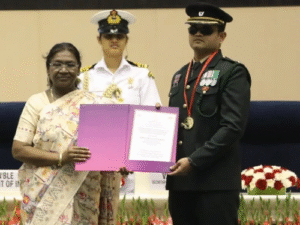Satyendra Nath Tagore (1842–1923) was a prominent Indian civil servant, educator, and intellectual, best known for being the first Indian to join the prestigious Indian Civil Services (ICS). His achievement not only made history but also set the stage for greater Indian involvement in the governance and administration of British India. Beyond his role in the civil services, he was an influential figure in the cultural and intellectual awakening of India during the 19th century.
Born: November 1, 1842, in Kolkata (then Calcutta), into a prominent Bengali family. He was part of the Tagore family, which played a significant role in the cultural and intellectual movement of Bengal. Satyendra Nath was the eldest son of Priyanath Tagore, a successful landowner, and Sureshvari Devi.
Education: Satyendra Nath was educated at the Hindu School in Calcutta, and later at the Presidency College, where he was an outstanding student. He was influenced by the ideas of Western education, English literature, and Indian philosophy.
His early exposure to both the traditional teachings of India and Western ideas helped shape his intellectual development. He was a brilliant scholar, fluent in English and highly influenced by the progressive ideas of his time.
Indian Civil Services (ICS): At the time, the ICS was the most powerful and prestigious administrative service in British India. It was a key instrument of British rule, and entry into the ICS was restricted mostly to British citizens.
The Exam in England: In the 19th century, the Indian Civil Services Examination was held only in England, making it incredibly difficult for Indians to participate. Despite this barrier, Satyendra Nath Tagore, with his intellectual rigor, decided to take on this challenge.
In 1863, he successfully passed the ICS exam, making him the first Indian to join the Indian Civil Services. He was appointed to a position in the British administration and joined the ICS at the young age of 21. His success was remarkable, as it was an achievement that few Indians could even aspire to due to the limitations and barriers imposed by the British government.
After joining the ICS, Satyendra Nath was posted to Varanasi (Benares), and later, Bihar, where he worked in various administrative roles.
Role in the British Administration: He worked as a magistrate and district administrator, often dealing with complex social and legal matters. His role in the administration was seen as a bridge between British governance and the Indian populace.
Resignation from ICS: Although he had a successful career in the ICS, Satyendra Nath was disillusioned with the limitations of his role and the British colonial rule. In 1871, after serving for several years, he resigned from the ICS to devote himself to intellectual pursuits and his passion for social reform, cultural development, and the Indian Renaissance.
Literary Contributions: After leaving the ICS, Satyendra Nath became deeply involved in the cultural and literary awakening of India. He was a prominent figure in the Bengal Renaissance and contributed significantly to the intellectual and cultural revitalization of Bengal.
He was a close friend and mentor to his younger brother, Rabindranath Tagore, the renowned poet and Nobel laureate, who was deeply influenced by Satyendra Nath’s thinking and ideas.
Satyendra Nath was associated with the Brahmo Samaj, a reformist socio-religious organization led by Raja Ram Mohan Roy, which sought to reform society by advocating for rationalism, education, and social progress. He was also a strong supporter of women’s rights, abolition of caste discrimination, and education for all.
Promotion of Music and Arts: Satyendra Nath Tagore had a strong interest in music and was a pioneering figure in the development of Indian classical music. He was instrumental in introducing Western classical music to the Indian public. He also played a role in the Bengali musical renaissance and was a prominent patron of the arts.
Cultural Influence: His literary works, including essays, translations, and poetry, contributed to the modernization of Bengali literature. His intellectual prowess helped promote the idea of Indian nationalism and an enlightened approach to reform in India.
Founder of the Indian National Congress: Satyendra Nath Tagore was one of the founding members of the Indian National Congress (INC), a political party that would later play a critical role in the struggle for India’s independence.
Though Satyendra Nath’s primary legacy remains his pioneering role in the ICS, his actions also contributed to a broader debate around the need for Indians to be part of the administrative processes of their own country. His success in the ICS highlighted the potential of Indian talent and led to greater demands for the inclusion of Indians in the civil services and in governance.
Satyendra Nath Tagore was married to Sushila Devi, and the couple had several children. His family was known for their intellectual and cultural contributions to Bengal and India at large.
Mentorship to Rabindranath Tagore: Satyendra Nath played an influential role in shaping the early thoughts of his younger brother Rabindranath, who would later become a world-renowned poet and the first non-European to win the Nobel Prize in Literature. Satyendra Nath’s dedication to rational thought, social reform, and national progress inspired Rabindranath’s own intellectual and creative development.
Influence on Education and Reform: Satyendra Nath Tagore’s contributions were not confined to his own generation. His dedication to education, arts, and social reform laid the foundation for future generations of Indian intellectuals. His work encouraged young Indians to pursue education, critical thinking, and intellectual independence.
Inspiration for Indian Civil Services: Satyendra Nath Tagore’s achievement in joining the ICS was a watershed moment for India. His success opened the doors for other Indians to follow, and many other distinguished figures in the freedom movement, such as Lal Lajpat Rai, Subhas Chandra Bose, and C.R. Das, were also graduates of the ICS.
Legacy in Literature and Music: His contributions to Bengali literature, music, and culture were enduring. His literary output continues to inspire Bengali writers and intellectuals, and his advocacy for reforming the education system helped shape India’s future educational policies.
Satyendra Nath Tagore passed away on January 12, 1923, in Kolkata. His death marked the end of an era in Bengal’s intellectual history, but his legacy continued to shape Indian society for decades to come.
Satyendra Nath’s contributions are commemorated in various ways in Kolkata and beyond. He is remembered for his pioneering work in the ICS, his support for the Bengal Renaissance, and his role in the intellectual and cultural awakening of India.
Satyendra Nath Tagore was a trailblazer and a visionary. He was not only the first Indian to join the Indian Civil Services but also a catalyst for reform in Indian society, culture, and education. His influence helped shape modern Bengali literature, classical music, and the Indian National Congress. His life and achievements continue to serve as an inspiration to future generations, both in India and abroad.







